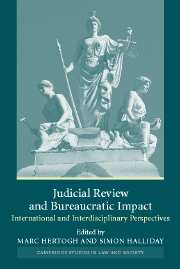Book contents
- Frontmatter
- Contents
- Acknowledgments
- Notes on the contributors
- Introduction
- Part One Conceptual and methodological issues
- Part Two International case studies
- 4 Impact studies in the United Kingdom
- 5 The politics of soft law: how judicial decisions influence bureaucratic discretion in Canada
- 6 The operation of judicial review in Australia
- 7 Legalising the unlegaliseable: terrorism, secret services and judicial review in Israel 1970–2001
- 8 Implementing court orders in the United States: judges as executives
- Part Three The future of judicial review and bureaucratic impact
- Bibliography
- Index
5 - The politics of soft law: how judicial decisions influence bureaucratic discretion in Canada
from Part Two - International case studies
Published online by Cambridge University Press: 29 July 2009
- Frontmatter
- Contents
- Acknowledgments
- Notes on the contributors
- Introduction
- Part One Conceptual and methodological issues
- Part Two International case studies
- 4 Impact studies in the United Kingdom
- 5 The politics of soft law: how judicial decisions influence bureaucratic discretion in Canada
- 6 The operation of judicial review in Australia
- 7 Legalising the unlegaliseable: terrorism, secret services and judicial review in Israel 1970–2001
- 8 Implementing court orders in the United States: judges as executives
- Part Three The future of judicial review and bureaucratic impact
- Bibliography
- Index
Summary
INTRODUCTION
There is remarkably little literature in Canada on the influence of judicial decisions on bureaucratic discretion. Since the enactment of Canada's Charter of Rights and Freedoms in 1982, scholarly interest has focused primarily on the influence of the Charter on the policy-making process (notably the rise in importance of the federal and provincial justice ministries), and the legislative process, rather than on the impact of judicial decisions on the exercise of administrative discretion. For these observers, it is as if the court's decision is the end of the story of a legal challenge to government action, rather than the beginning of a complex, new chapter. The aim of this paper is to shift the focus of the analysis to the process by which judicial decisions influence the exercise of discretionary authority by front-line decision-makers.
There is good cause to be suspicious of the assumption that, once a court has issued a ruling, public officials simply comply with it, and, if they do not, further litigation (or the threat of it) serves as an adequate alternative remedy. Front-line discretionary decision-makers typically will not have the time, the expertise or the inclination to read and digest case law, even when judicial orders or reasons directly relate to their decision-making. The remoteness of the judicial action is accentuated when the decision at issue is general in nature, dealing with broad principles of statutory interpretation rather than a particular factual circumstance.
- Type
- Chapter
- Information
- Judicial Review and Bureaucratic ImpactInternational and Interdisciplinary Perspectives, pp. 129 - 160Publisher: Cambridge University PressPrint publication year: 2004
- 3
- Cited by



